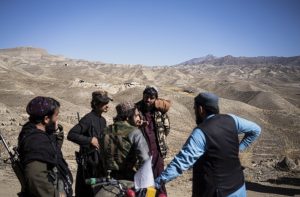The Taliban takeover of Kabul in August 2021 left China with a dilemma. Not only did Beijing now share a border with a country ruled by a group considered a terrorist pariah by much of the world, but China was also the closest strategic ally of the Taliban’s principal supporter in the international arena, Pakistan. As the rest of the world withdrew from Afghanistan, Beijing suddenly found itself in an influential position by default, juggling a number of key relationships without having the shield of U.S. hard power to ultimately hide behind.
In many ways, the image of a sea receding from shore is a useful analogy. While the United States and its allies were present in Afghanistan bolstering the Republic government, a sea washed over Afghanistan that hid a number of issues. As the U.S. and its allies left, this tide retreated, exposing brutal realities on the ground. Among those was the fact that China has no real choice but to engage with Afghanistan given its geographical position and its security concerns on the ground.
Yet this reality has had a remarkably limited effect on China’s actual activity in Afghanistan and the wider region. In many ways, Beijing has sought to continue the relatively limited engagement efforts that were being undertaken prior to the takeover of Kabul by the Taliban. The oft quoted narrative of a Chinese surge was overplayed.
Prior to the collapse of the Republic, Beijing was a partner of the Afghan government, exploring economic opportunities as well as addressing key security concerns. They also explored working with other countries in Afghanistan (like the United States, India, or European powers), and followed through on some limited programming. China was a provider of vaccines and other COVID-19 management tools and had participated in the many different regional engagements that sought to help Afghanistan, including creating specific trilateral formats bringing together Afghan and Pakistani officials. Following the collapse of the Republic government, the level of activity at an official level has stayed similar, though changed to adapt to the new authorities in Kabul.
In security terms, China cooperated closely with the Republic on Uyghur militants Beijing saw gathering in Afghanistan. They are still trying to build this relationship with the Taliban.

































